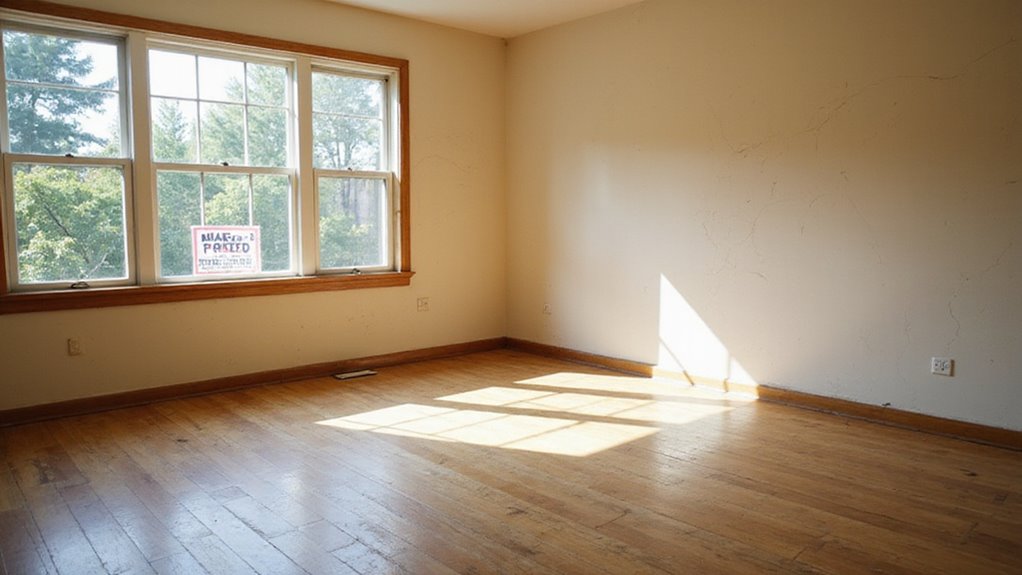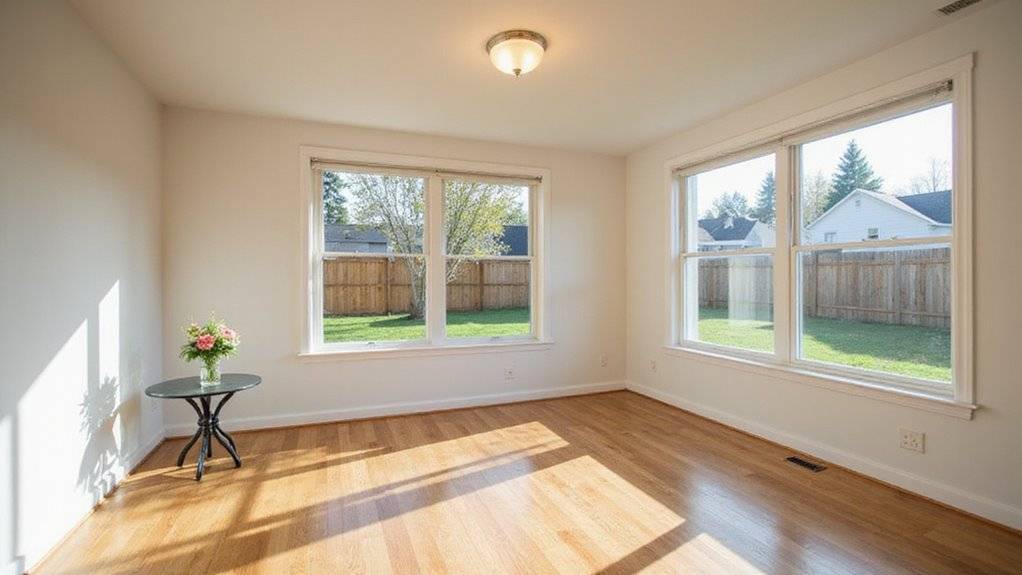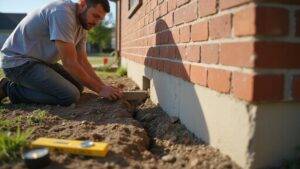Selling a vacant house without making repairs can be tough. Most buyers want move-in ready homes, and flaws can scare them away. You might worry about the time, cost, and stress involved.
Vacant homes can attract low offers or sit on the market for months. Potential buyers may assume problems are worse than they appear. You could end up losing money or feeling overwhelmed by the process.
You can sell a vacant house without repairs by targeting the right buyers and using smart selling strategies. Focus on investors and cash buyers who prefer as-is deals.
Highlight your home’s potential and price it competitively. This blog will guide you through the steps and help you sell quickly and with less hassle.
Key Takeaways
- Disclose all known property defects honestly to comply with legal requirements and prevent future disputes.
- Price the house competitively based on its current condition and recent sales of similar properties.
- Market the property as an “as-is” investment opportunity, highlighting its potential for renovation or flipping.
- Use clear photos, videos, and detailed descriptions on popular real estate platforms to attract serious buyers.
- Prepare all necessary paperwork, verify title, and address buyer questions quickly to ensure a smooth closing process.
Understanding the As-Is Home Sale

When you sell a house “as-is,” you are telling buyers you will not fix or upgrade anything. Buyers know they must handle any repairs themselves. This approach often attracts investors or people who want a project. Sellers should be aware that they are still legally required to disclose all known defects to potential buyers during this process.
Curb appeal is still important for an as-is sale. If the garden looks neat, more buyers may be interested. Trimmed hedges and a clean yard create a good first impression.
A tidy outside can make the home seem more valuable. If you focus on simple yard work, you may get more attention. These easy steps can help your home stand out, even without any indoor updates. Some buyers, like trusted home buyers, specialize in purchasing houses as-is so you can avoid repairs and sell quickly.
Identifying Your Target Buyer
When selling a vacant house, you’ll get the most traction by appealing to real estate investors and attracting house flippers. These buyers value properties they can quickly renovate or add to their portfolios. Focus your strategy on showcasing the capacity for quick returns and investment opportunities.
Many investors appreciate the fast, effortless process that comes with selling a vacant home as-is, allowing them to avoid delays and begin renovations or resale quickly. It’s also important to be aware of legal considerations when selling a property, especially if it’s being sold under a special financing arrangement like a land contract.
Real Estate Investors Appeal
Real estate investors want properties with profit potential, not move-in ready homes. They look for vacant houses priced below the market. If you have a house to sell, focus on its investment value.
Low prices attract investors because they offer instant equity. Investors may move quickly if you offer flexible closing dates. They appreciate simple and fast transactions.
If you show local price trends, investors can see the possible returns. You should provide recent sales numbers to support your price. The property becomes more appealing if buyers can see clear profit potential.
Investors want a business opportunity, not a dream home. If you market your house as a smart investment, you will get their attention. Investors will respond to a deal that promises a strong return.
Attracting House Flippers
To sell a vacant house quickly, you should focus on attracting house flippers. Flippers look for homes that need repairs and offer investment potential. They do not require move-in ready properties.
Highlight the home’s strong structure, good location, and any recent improvements. Even small updates like garden cleaning or curb appeal can help. Flippers usually plan to remodel interiors, so you do not need to stage the home.
Share details about the home’s size, land, and recent neighborhood sales. If you provide this data, flippers can estimate their profit easily. Understanding their needs will help you find serious buyers with cash.
Assessing the Condition of Your Property

Assessing your property’s condition helps you understand what buyers will notice. If you know the strengths and weaknesses, you can plan better. This step is important, even if you plan to sell as-is. Knowing your property’s strengths and weaknesses lets you plan and prepare for what buyers will notice most.
Start outside by checking the landscaping, paint, and roof. If the yard looks messy, consider simple clean-up ideas. A tidy exterior can make the house look more inviting.
Inside, look for visible damage or old systems. Check the floors, walls, and windows for any issues. If you find safety hazards, note them for potential buyers.
Check the plumbing, electrical, and heating systems. If something does not work, buyers will want to know. A clear assessment can help avoid surprises during the sale.
If you evaluate your property carefully, you can market it honestly. This approach builds trust and attracts serious buyers. If you decide to sell to local North County, MO buyers, they will appreciate an honest assessment and may offer a fair cash price even if repairs are needed.
Determining a Competitive Asking Price
To set a price that attracts buyers, start by studying recent sales of similar vacant properties in your area. You’ll also need to account for any repairs or updates the house may require. If you want to avoid the hassle of fixing up your house, you can consider working with cash home buyers, who purchase properties as-is and often close quickly without any commissions or hidden fees.
Finally, assess current market demand so you can position your property competitively from day one. Sellers who want to sell in any condition can often price their property more aggressively, since buyers may be willing to overlook needed repairs if the process is fast and effortless.
Research Comparable Property Sales
To find the right price for a vacant house, look at recent sales of similar properties. Compare homes with the same size, age, and location that sold in the past six months. This helps you set a fair price based on current trends.
If you review listings, you can see which homes sold fast and which took longer. Pay attention to final prices, days on market, and any price drops. These details reveal what buyers are willing to pay.
You should use online databases or ask a real estate agent for accurate sales data. Reliable information will make your pricing strategy stronger. This approach attracts serious buyers and helps your home sell faster.
Factor in Repair Costs
You should include repair costs when setting your home’s price. Buyers will compare your house to others and notice any needed repairs. If you skip this step, your price may be too high.
It is best to get quotes from contractors or repair professionals. Accurate estimates help you avoid guessing about costs. This way, you can adjust your price based on real numbers.
If you clearly show repair costs in your price, buyers are more likely to trust you. Serious buyers and investors look for fair deals. Transparent pricing can help your home sell faster in a competitive market.
Analyze Market Demand
To understand market demand, check how many similar homes are for sale in your area. High competition means you may need to lower your price. Low supply could let you set a higher price.
Seasonal trends can affect buyer interest and sales speed. Spring and summer usually bring more buyers. If you sell in winter, expect slower activity and possibly lower prices.
Recent sales of vacant homes in your area give useful price benchmarks. You should compare your home to these to set a fair price. If the market changes, adjust your strategy quickly.
Disclosing Property Defects Honestly
You must always tell buyers about any defects in your vacant house. Honest disclosure is required and helps avoid trouble later. If buyers know about problems, they feel more confident moving forward. Working with fair cash offers can also give sellers peace of mind, since these buyers are used to handling homes in any condition.
Sellers should mention issues like roof leaks, foundation cracks, or old systems. If you hide defects, deals may fall through after inspections. Full disclosure can help build trust with buyers.
Staging and curb appeal do not make up for hidden defects. A detailed disclosure statement is a better approach. Serious buyers want to know the real condition before making an offer.
For example, if the property contains asbestos materials, you are legally required to disclose this information to potential buyers to avoid future legal complications.
Highlighting the Potential of Your Home

Even if your home is empty, you can show its full potential to buyers. An empty space lets buyers imagine their own style and changes. If you highlight your home’s strengths, buyers can see the possibilities.
A blank canvas is not a drawback. Buyers will not be distracted by old décor and can focus on the home’s structure. Tidy landscaping and a clean entryway create a great first impression. If your home has any foundation issues, being upfront about them can help set realistic expectations for buyers.
Strategic lighting can make rooms feel warm and welcoming. Clean lines help buyers picture how their furniture would fit. Flexible spaces can serve many purposes, like an office or playroom.
If your home has large windows or an open layout, point these out. Buyers may want to customize or expand if they see future potential. You could also mention ideas for upgrades or share popular design trends.
You can also attract more interest by working with a local cash home buyer who can provide a fair offer and handle all the paperwork, making the process easier even if your house needs repairs.
Staging the House for Maximum Appeal
Staging helps buyers imagine living in your home. If you stage well, your house looks more appealing and sells faster. Good staging also highlights your home’s best qualities.
Start by improving curb appeal. Trim the lawn and clean the front yard. A neat entryway makes a strong first impression. Working with a family-owned local business can also give you insights into what local buyers find most attractive.
Inside, use simple decor like neutral curtains or a few pieces of art. Proper lighting makes rooms look brighter and larger. Open blinds and replace any dim light bulbs.
If you keep rooms tidy and uncluttered, buyers can picture their own furniture in the space. Each room should show a clear purpose. This helps buyers connect with your home and consider making an offer.
Before listing, it’s also smart to check for moisture and mold issues to avoid surprises that could impact your sale.
Choosing the Right Selling Strategy

The right selling strategy helps you attract buyers and get the best price. Your home is empty and ready for new owners. If you make the right choice, you can sell faster and for more money.
You can look at recent home sales in your neighborhood for guidance. Local real estate agents can also give useful advice. If you use their insights, you will better understand what buyers want. If you’re looking to avoid real estate agent fees, selling directly to a local investor could be a smart choice.
If you want a traditional sale, you can hire an experienced agent. The agent will market your home to buyers who are ready to move in. If the market is strong, this method works well.
If speed is important, you can sell to an investor. Investors often buy homes quickly for cash. You might get a lower price but close the sale faster.
If you want to create excitement, you can try an auction. An auction can attract multiple buyers and lead to a quick sale. If there is high demand, you could get a good price.
You should consider the condition of your home and your timeline. If you stage the home and improve curb appeal, buyers may offer more. Choose the strategy that fits your needs and goals.
If you want to avoid repairs and sell quickly, selling to a cash home buyer can be a stress-free option because they purchase houses in any condition and offer fast, fair cash offers.
Listing Your Property on the Right Platforms
To reach motivated buyers, list your vacant property on the best real estate websites. Choose popular platforms like Zillow, Realtor.com, and your local MLS. These sites attract people who are actively searching for homes.
If the platform allows, add clear photos and videos of your property. Good visual content helps buyers see the space, even without furniture. Virtual tours can also keep buyers interested if they cannot visit in person.
Professional photography is important, even if you skip traditional staging. Social media platforms like Facebook Marketplace can help you reach more local buyers. If you use these channels well, your home will get noticed by the right people.
Marketing to Investors and Flippers

To attract investors and flippers, you need to clearly showcase your property’s investment potential with facts and figures. Focus your outreach on local real estate groups and investor networks where serious buyers are actively looking for opportunities. By positioning your vacant house as a smart investment, you’ll increase your chances of a quick, profitable sale.
Highlight Investment Potential
Vacant houses can be great investments if marketed wisely. Investors look for properties with high profit potential. Highlighting these points can attract more buyers.
Share the property’s after-repair value to show possible future gains. Present recent sales of similar homes to back up your claims. If you provide this data, investors may show more interest.
Explain simple renovation options to buyers. A flexible layout or easy upgrades can make renovations less costly. If the house has expansion space, mention this as well.
Show local market trends, like high rental demand or rising home prices. If the area is popular, buyers may see more income potential. Point out these facts to support the property’s value.
Target Local Real Estate Networks
Local real estate networks are key to finding fast buyers for vacant homes. Investors and house flippers in your area often act quickly. They look for properties they can fix and resell for a profit.
Property owners should contact local investor groups and attend real estate meetups. Online platforms for cash buyers are also useful. If you use these channels, you reach more serious buyers.
Listings should mention neighborhood improvements and future value. Virtual staging or renovation ideas can help buyers see potential. If the house is presented as a blank canvas, profit-minded buyers may act faster.
Negotiating Offers Effectively
Negotiating offers is where you can get the most value for your house. If you approach each offer carefully, you increase your chances of a better deal. Consider more than just the price. Careful negotiation of each offer gives you the best chance to maximize your home’s value—look beyond just the price.
You should show buyers how your home staging and marketing make your property stand out. If you highlight these points, you help justify your asking price. Buyers may be more willing to meet your terms.
Sellers should remain open to the buyer’s needs. If buyers need a flexible closing date or certain contingencies, consider these requests. You can sometimes make small changes that help reach an agreement.
Every counteroffer should be clear and based on current data. If you use information from recent sales, buyers are more likely to understand your position. Prompt and informed responses help move the negotiation forward.
Navigating the Inspection Process
You need to be upfront about your property’s condition to build trust and avoid surprises during the inspection. Address buyer concerns quickly and professionally, as this can keep negotiations on track. By anticipating common issues in vacant homes, you’ll strengthen your position and streamline the closing process.
Disclosing Property Condition
When you sell a vacant house, you must honestly share its condition. Buyers will look closely at every detail during inspections. Full disclosure protects you and helps buyers trust you.
A detailed Seller’s Disclosure should list every known problem. If you have any old inspection reports or repair estimates, share them. This shows you are open and honest.
Recent cleaning or landscaping work can help reassure buyers. If you highlight maintenance, buyers may feel more confident. Trust is important when selling in a crowded market.
Being clear about your property’s condition can make negotiations smoother. Buyers will appreciate your honesty. If you are not making repairs, transparency is your best tool.
Handling Buyer Concerns
Buyers will look for problems in your vacant house. They often ask about repairs and how things work. If you answer these questions clearly, you can build their trust.
You should share inspection reports or maintenance records, if available. These documents help buyers feel more confident about the property. If buyers trust you, negotiations can go more smoothly.
Even if you have not made repairs, keep the outside neat and clean. Trim the lawn and clear the entryways. Staging the home with a few items can help buyers imagine living there.
If you deal with concerns before buyers ask, you may avoid bigger problems later. Buyers like honesty and clear information. Being prepared gives you more power when negotiating.
Handling Paperwork and Legal Requirements
Handling the paperwork and legal requirements is important when selling a vacant house. These steps help you avoid delays and legal problems. If you do not handle them properly, the sale could fall through. Managing paperwork and legal steps is key to preventing delays or failed sales when selling a vacant house.
The first step is to check your title deeds. You must confirm you legally own the house and fix any mistakes. Buyers and their banks will look at these documents carefully.
Title insurance is also important. It protects both the seller and the buyer from problems like old liens or ownership disputes. If you secure title insurance, buyers will feel more confident.
Sellers must provide all mandatory disclosures required by state law. These include any problems or repairs with the house in the past. If you gather all documents early, you will make the sale process smoother.
Closing the Sale Smoothly
Closing the sale of a vacant house requires careful planning. Sellers should prepare all documents and confirm the buyer’s financing. This helps avoid problems at the last minute.
If the property is staged, share a move-in checklist with the buyer. The checklist helps buyers feel ready and confident. Virtual tours can also remind buyers of the home’s value.
Sellers must work closely with their real estate agent and title company. Quick responses to questions can prevent delays. Open communication helps solve issues before closing.
If you keep the process simple and clear, buyers are less likely to worry. A smooth closing leaves buyers satisfied with their purchase.
Conclusion
If you want to sell your vacant house without making repairs, selling “as is” can be a great option. If sellers price the property fairly and stay honest about its condition, they can attract the right buyers. If you highlight the strengths and remain transparent, you can move toward a fast and successful sale.
If you would rather avoid repairs and waiting for the right buyer, you have other options. If you choose to work with a cash home buyer, you can skip the traditional selling process. If you decide to sell to a company like ours, you can get a fair cash offer and close quickly.
If you need to sell your vacant house for cash, we are here to help. If you want a simple sale, Freedom Path Investors can make you a no-obligation offer. Contact us today to see how we can help you sell your house fast.







